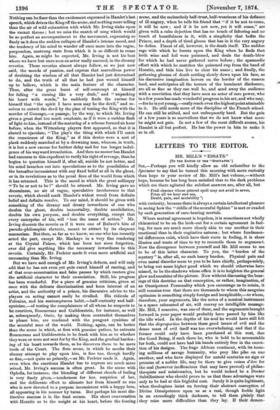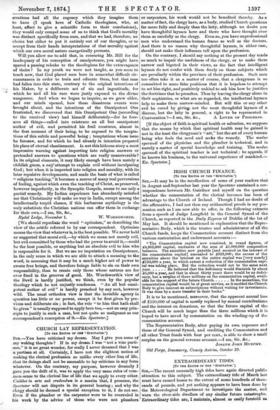LETTERS TO THE EDITOR.
MR. "ESSAYS."
[TO TES EDITOR OF T55 fincrATos.1 SIR,—Perhaps you will kindly allow an old subscriber to the Spectator to say that he turned this morning with more curiosity than hope to your review of Mr. Mill's last volume,—without hope, because he has long been satisfied that to the dark problems which are there agitated the subtlest answers are, after all, but "Frail charms whose uttered spell may not avail to sever, From all we hear and see,
Doubt, pain, and mutability ";
with curiosity, because there is always a certain intellectual pleasure in seeing how the "riddle of the scornful Sphinx" is met or evaded by each generation of care-bearing mortals.
Where mutual agreement is hopeless, it is sometimes not wholly chimserical to be on the look-out for a certain agreement in feel- ing, for men are much more closely akin to one another in their emotional than in their cogitative natures ; but where fundamen- tal differences exist, which have their roots in feeling, it is sheer illusion and waste of time to try to reconcile them to argument. Now the divergence between yourself and Mr. Mill seems to me to be of this latter character. To you, the "burden of the mystery" is, after all, no such heavy burden. Physical pain and even moral disorder seem to you to be here chiefly, perhaps solely, to bring out some higher good which we should otherwise have missed, to be the shadows whose office it is to heighten the general glow and sunshine of the picture. Now without discussing the bear- ings of this doctrine on that conception, or rather, imagination, of an Omnipotent Personality which you encourage us to retain, it still remains true that there are thousands to whom this sanguine optimism is something simply foreign and inexplicable,—to whom, therefore, your arguments, like the notes of a musical instrument in a space exhausted of air, will convey no intelligible message. Mr. Mill, I conceive, was one of these, and the arguments brought forward in your paper would probably have passed by him like the idle wind. In the depths of his soul he would have still felt that the disproportion between these good issues of evil and the dense mass of evil itself was too overwhelming, and that if the former could only have been purchased at this cost, then the Good Being, if such there be, who is held to be accountable for both, could not have had his hands entirely free in the execu- tion of his designs. The huge African continent, with its teem- ing millions of savage humanity, who prey like pike on one another, and who have displayed for untold centuries no sign or promise of a nobler life, may be there to give raison d'être for the zeal (however inefficacious that may have proved) of philan- thropists and missionaries, but he would indeed be a Doctor Subtllissimus who should prove to us that these advantages were only to be had at this frightful cost. Surely it is quite legitimate, when theologians insist on forcing their abstract conception of Divine Omnipotence upon us as a real, though feeble light in an exceedingly thick darkness, to tell them plainly that they raise more difficulties than they lay. If their demon-
strations had all the cogency which they imagine them to have (I speak here of Catholic theologians, who, at least, affect to give a scientific form to their conclusions), they would only compel some of us to think that God's morality was distinct specifically from ours, and that we had, therefore, no choice but either to put it entirely out of our thoughts, or to accept from their bands interpretations of that morality against which our own moral nature energetically protests.
Will you allow me to add that, in censuring Mr. Mill for the inadequacy of his conception of omnipotence, you might have spared a passing rebuke to the theologians for the extravagance of theirs ? In my youth we were not taught, as you seem to teach now, that God placed men here in somewhat difficult cir- cumstances in order to train and educate them, but that man had fallen into this state, contrary to the original intentions of his Maker, by a deliberate act of sin and ingratitude, for -which he and all his race were justly exposed to the divine -vengeance. And when we began to inquire, as we grew older, and our minds opened, how these disastrous events were brought about, and the intentions of the Omnipotent One frustrated, we discovered that this Omnipotent One (according to the received view) had himself deliberately—for he fore- sees all things—called into existence an all but omnipotent author of evil, and permitted his frail creatures, almost in the first moment of their being, to be exposed to the tempta- tions of this subtle and powerful being ; temptations whose kerne be foresaw, and for which he had already in intention prepared his place of eternal chastisement. Is not this hideous story a most impressive warning against importing into religion answers or pretended answers to questions which are really unanswerable? In its original elements, it may likely enough have been merely a childish guess, a nail attempt to explain evil without inculpating God; but when it is imported into religion and morality, with its later repulsive developments, and made the basis of what is called
religious teaching," it becomes a source of many real perversions of feeling, against which even the teaching of Christ, as preserved, however imperfectly, in the Synoptic Gospels, seems to me only a partial remedy. My Indian experience has abundantly satisfied me that Christianity will make no way in India, except among the intellectually torpid classes, if this barbarous mythology is the only substitute the Christian nations can offer them in exchange for their own.—I am, Sir, &c.,
[We should repudiate the word "optimism," as describing the -view of the article referred to by our correspondent. Optimism means the view that whatever is, is the best possible. We never held or suggested that moral evil,—by which we mean not merely evil, but evil committed by those who had the power to avoid it,—could be the best possible, or anything but an absolute evil to him who is responsible for it. But we see no imputation on Omnipotence, Tin the only sense in which we are able to attach a meaning to the word, in assuming that it may be a much higher act of power to create free beings, and therefore beings liable to sin on their own -responsibility, than to create only those whose natures are for ever fixed in the grooves of good. Mr. Wordsworth's view of the Devil is hardly justified, we think, even by the popular -theology which he not unjustly condemns. "An all but omni- potent author of evil" is hardly preached by any sect, however wild. The usual orthodox view is that the invisible agency in question has little or no power, except it be first given by pre- 'nous and deliberate sin ; in fact, the rule " to him that hath shall be given" is usually supposed to apply here too,—not an easy prin- oiple to justify in such a case, but not quite so malignant as our correspondent's conception of it.—En. Spectator.]



































 Previous page
Previous page